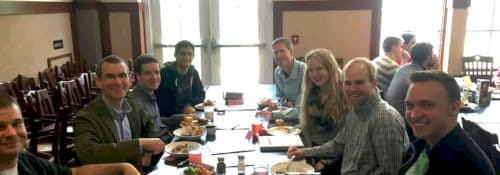
Playing with Ideas
The Intellectual Sport of Economics Lunch
Written by Jenny Wiland
What do you get when you combine pizza, college students, and an informal discussion on industrial policy? The answer: Hillsdale’s economics lunch.
Each Wednesday at noon, a handful of students gather in the formal lounge. They sit on couches, eat pizza, and engage in classic Hillsdalian intellectual conversation about a specific, economics-related topic—anything from socialism to price gouging to modern monetary policy. This week’s discussion focused on economic nationalism and whether the government should influence the economy through industrial policy, which could include anything from funding science research to implementing tariffs.
Dr. Christopher Martin, associate professor of economics, acts as a moderator, calling on students to speak in turn. Sometimes he’ll add a point of his own, but most of the time, he’s happy to let the students guide the conversation and bounce ideas off each other. “It’s a chance to talk about big picture economic questions in a free-flowing, friendly way,” he says. “It’s an intermediate space between class, which is pretty formal, and a late-night dorm room discussion, which has no structure.”
Dr. Martin has been running economics lunch for the past six years after inheriting it from another professor. Many successful graduated students he’s seen were great participants in these weekly discussions, and he has a ready appreciation for the value of this discussion space. “In class, you have to follow the leader. Here, you get to play with and test out ideas. It’s like playfulness in sport, but instead, we’re playing with ideas.”
The sport of economics lunch only has two rules: don’t use ad hominem attacks, and don’t assign a certain point of view to the person who talked about it once the conversation is over. It is, after all, a playground for ideas. A student could play devil’s advocate one moment, or not fully know what they think the next. That’s what makes the discussion interesting—it’s a safe place to experiment with ideas, whether you agree with someone’s point, disagree, or aren’t even sure what you think.
And you don’t have to be an economics major to come to economics lunch. Any student is welcome to join. Dr. Martin sends out articles ahead of time so students can get a basic understanding of the topic of the week, and for those who don’t have time for the readings, he takes the first few minutes of the discussion to summarize the basic points before letting the students dive in. So whether you’re writing your senior thesis on global trade or you’re not even sure what “supply and demand” means, stop by the formal lounge, grab some pizza, and play with your fellow students in intellectual sport.
If you like this, you’ll love
Praxis: Economics that Fosters Dialogue
Economics: What Can I DO with That?
 Jenny Wiland, ’23, plans to study psychology and graphic design. She loves her cat, dark chocolate, and writing stories, especially science fiction and fantasy.
Jenny Wiland, ’23, plans to study psychology and graphic design. She loves her cat, dark chocolate, and writing stories, especially science fiction and fantasy.
Published in April 2020